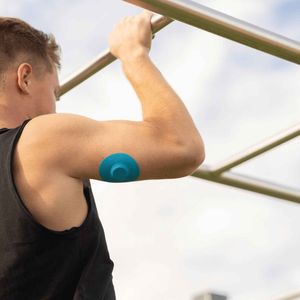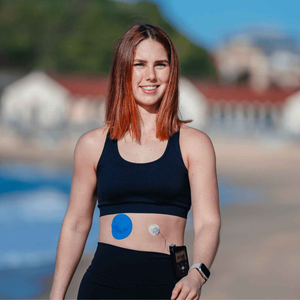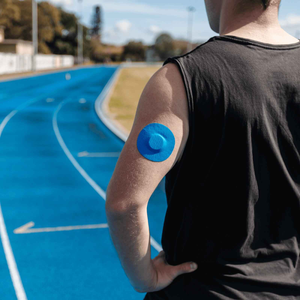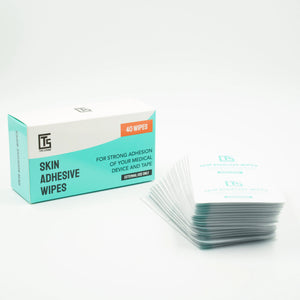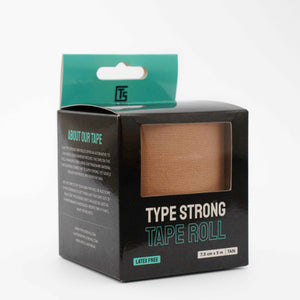Continuous Glucose Monitoring (CGM) devices have been around since 1999 in one form or another to help people keep track of their blood glucose levels and reduce the risks of diabetes-related complications. CGMs provide a more efficient method of measuring blood sugar levels when compared to glucometers as they can be used ‘on the go’ by simply checking your phone.
There are two primary categories of CGMs, and within these two, there are various brands and devices available around the world.
The Two Types of systems used in CGMs
Real-time CGM (also referred to as continuous monitoring)
Real-time CGM devices are capable of automatically transmitting continuous streams of blood glucose data to its users. Their systems also come with built-in alerts, active alarms and the ability to share real-time glucose data through receivers, smartphones or other smart devices.
These kinds of monitors have many benefits and are mainly recommended for Type 1 diabetes or for people requiring strictly controlled insulin therapy. Real-time CGM devices are also essential for impaired hypoglycemia awareness, a diminished ability to perceive the onset of hypoglycemia (extremely low blood glucose levels). They are also beneficial for athletes, children and those who need support from caregivers.
Intermittently Scanned CGM (mostly referred to as flash monitoring or FGM)
Flash glucose monitoring devices (FGMs) are similar to CGMs except that they require its users to purposely scan the sensors with a reader, a smart device or a smartphone. These devices also don’t connect with insulin pumps or provide alerts if your glucose levels are high or Low.
FGMs are mostly recommended for people with pre-diabetes or people who are recently diagnosed with type 2 diabetes who want more data and are beginning to learn how to manage their food and exercise. They are also used for individuals who need to check their blood glucose frequently throughout the day, like women with gestational diabetes.
These monitors are primarily used when doctors need to help their patients recognise the direct connection between their dietary habits and the changes in their blood sugar levels. Hence, they are also used for type 1 diabetes.
CGM and FGM systems come in many shapes and sizes, and are offered by a number of different brands. We will provide a brief overview of these below.
Different brands and models of CGM devices
The Freestyle Libre from Abbott
The Freestyle Libre has three models, two of which are approved and are available in the market - all models use the flash glucose monitoring system. They are manufactured by Abbott Laboratories, which has a long-standing image in the diagnostics, medical devices, and nutrition industries since 1888. Even though the company is not specialised in CGM devices, the Freestyle Libre monitors are very well known and trusted.
Freestyle Libre’s first model was launched in 2017, using interstitial fluids to measure the blood glucose. The device works by applying a sensor to the body, the sensor lasts for 14 days and can store 8 hours worth of data. The user can access this data by ‘waving’ the Abbott monitor or a smart phone over the sensor. This process can be repeated as many times as desired. Please note that the Abbott monitor can only store up to 90 days worth of data and it is necessary to move this data to a computer to prevent deletion.
The second Freestyle Libre model (released in 2020) has an integrated continuous glucose monitoring system (iCGM), and is known for efficiency and accuracy. The device is approved for adults and children as young as four years old and offers features like customisable alarms.
Guardian Connect from Medtronic
Medtronic was the first company to ever get approval for CGM devices in 2001. The company was founded in 1949, and although it doesn’t specifically focus on diabetes care, the Medtronic Guardian Sensors are one of the most advanced and trusted in the market.
Medtronic also offers several devices, and some of them are the guardian connect smart CGM, IPRO 2 professional CGM and Minimed series.
The Guardian™ Connect CGM monitors are one of the most integrated and smart CGMs that use the real-time system. They compile time in range data that gives information regarding how long your glucose stays in your ideal range throughout the day. They also allow you set alerts anywhere from 10 to 60 minutes, notifying you about the highs and lows of your glucose levels whenever you want. The system works through a small sensor that can be worn for 7 days along with a discreet Bluetooth transmitter, both of which work together to deliver accurate, automatic readings to your smart devices.
There are a few limitations to these devices as they have an age restriction and can only be used for ages 14 and above, and they are also one of the more expensive options available.
The IPRO 2 professional CGMs can regularly record blood glucose levels 24 hours a day for up to six days. These devices are used intermittently, helping healthcare providers gain valuable insight into how the user’s diet plans, everyday activities and medication regimes affect their blood sugar levels. They assist people with type 1 diabetes to make informed decisions regarding their diabetes management.
The MiniMed System: These are a combination of insulin pumps and the Medtronic Guardian CGMs and sensors. Hence they can automatically detect sugar level readings and release appropriate levels of insulin in the body. The 770G system is the latest option in the series, including the Guardian Sensor 3 and the Guardian Link 3 transmitter.
90-Days and 180-Days Implantable CGMs by Eversense
Eversense is created by Senseonics, and it specialises in diabetes management systems. The brand is also comparatively new in the market compared to other options. Eversense offers a US FDA approved 90-days implantable CGM and a 180 days XL CGM.
The 90 days implantable CGMs can be applied by your doctor, and they do not require changing for 90 days, as the name suggests. The key difference of these devices is that they use internal sensors, which are implemented surgically, but the transmitters are still visible on the skin. These devices use continuous minoring systems, offering alarms, data sharing and smart devices connectivity through apps.
The downside of these CGMs is that they can only be used by people aged 18 or over.
The 180 days Eversense XL CGMs: These devices offer a sensor that can last up to 180 days and do not require the usual replacement every 1 to 2 weeks. However, these are yet to be approved and made widely available in the market.
The G5 and G6 CGMs from Dexcom
Dexcom is one of the most well-known brands of diabetes management systems, and they specialise in manufacturing CGM devices. The company has a long-standing partnership with two big insulin pump manufacturers, the Insulet Corporation and the Tandem Diabetes Care. This makes for an easy connection for people with type 1 diabetes who require insulin pumps.
The G5 and G6 CGMs are both approved for anyone over the age of 5 and offer better accuracy than the Freestyle Libre. The G5 needs finger-stick calibration and lasts for 7 days; however, the newer G6 model does not require calibration and also lasts for 10 days. Both CGMs use the real-time system to record blood glucose levels and come with customisable alerts, sensors that transmit data automatically every 5 minutes, and smartphone/devices connectivity through an app.
Wrapping Up
Enhance the reliability of your CGM devices by investing in our premium CGM Adhesive Patches. Ensure your device stays in place, providing accurate readings for effective blood glucose monitoring. Don't let concerns about adhesion limit your freedom. Try our patches today and experience the assurance of continuous glucose tracking. Take charge of your diabetes journey with the support you deserve. Order now for a worry-free and active lifestyle!
|
Since we launched Type-Strong, we have noticed an increasing demand from Dexcom users asking us to create a Dexcom version of our adhesive patches to help them secure their CGM. We are excited to announce that we will be officially releasing adhesive patches for the Dexcom G5 and G6 devices on 6th June at 5pm AEST. If you use a Freestyle Libre or Medtronic Guardian device, don’t worry we’ve got you covered also. You can view our range of adhesive patches here. |
